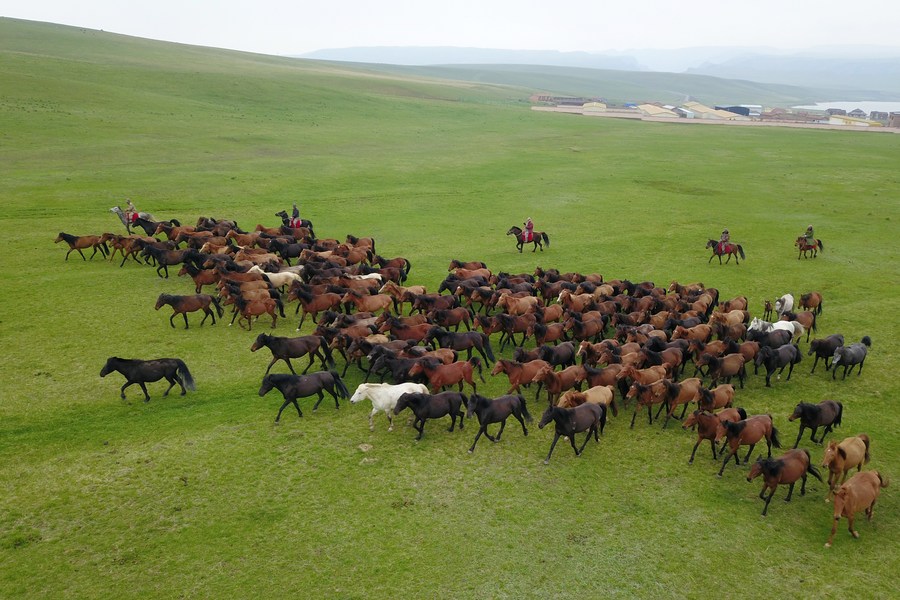From backwater to clean energy base, China's Gansu accelerates green development
* Over the past decade, China's Gansu Province recorded an average annual economic growth of 6.9 percent and accomplished the feat of lifting about 5.52 million people out of poverty.
* Meanwhile, it has made headway in preserving the ecology and environment, developing emerging industries, and building itself into a clean energy base.
* Tapping its clean energy resources, Gansu aims to step up new energy development and make further contributions to China's carbon emission reduction goals.
LANZHOU, Aug. 31 (Xinhua) -- At the foot of the Qilian Mountains, 43-year-old Liu Guonian has been breeding and herding horses for over 20 years.
Liu works at the Shandan Horse Breeding Farm, one of the oldest horse ranches in the world, with a history of more than 2,000 years. It now serves as a massive horse breeding facility in China.
Over the years, Liu and other herders have witnessed the ecological transformation in the Qilian Mountains-- a vital ecological barrier and a significant area for biodiversity conservation in western China. It is also home to much alpine germplasm and serves as a crucial corridor for wildlife migration.

Aerial photo taken on June 19, 2021 shows horses galloping at the Shandan Horse Ranch in Shandan County, Zhangye City, northwest China's Gansu Province. (Xinhua/Fan Peishen)
BETTER ENVIRONMENT
"The mountains here are greener, and the water is clearer," said Liu.
Due to the over-exploitation of mineral resources and illegal construction, the environment here once suffered severe damage.
The issue aroused much attention from the central authorities. From 2017 to 2021, the central and provincial authorities invested 19.5 billion yuan (about 2.82 billion U.S. dollars) in the ecological restoration and sustainable development of the Qilian Mountains.
Under the supervision of governments at various levels, exploration and mining projects in the natural reserves of the Qilian Mountains and business projects in the core area have been closed.
Today's Qilian Mountains have taken on a fresh look. Rare species such as snow leopards, Tibetan wild donkeys, and white-lipped deer have been frequently spotted by locals and captured on camera.
A better environment brings about economic benefits. After a high-speed railway station near the Shandan Horse Breeding Farm went into operation in late 2021, more tourists visited the historic ranch.
The opening of the rail station will provide vital transportation support for environmental protection and the development of sustainable industries in the Qilian Mountains, said Chen Jin, deputy head of Shandan County in Gansu Province.
Gansu, a transport hub along the ancient Silk Road and the Belt and Road, is a remote inland region in northwestern China.
The harsh natural environment, inadequate infrastructure facilities, and weak industrial foundation have hindered its development and made it a key battleground in the country's epic fight against poverty.
Over the past decade, the province recorded an average annual economic growth of 6.9 percent and accomplished the feat of lifting about 5.52 million people out of poverty.
Meanwhile, it has made headway in preserving the ecology and environment, developing emerging industries, and building itself into a clean energy base.
RURAL PROSPERITY
A decade ago, nearly 40 percent of the rural residents in the province were still poverty-stricken. By late 2020, Gansu had lifted all its 75 impoverished counties out of poverty.
Ma Qiangqiang, 27, has opened a coffee shop in Ehela Village, in Gannan Tibetan Autonomous Prefecture.
Over recent years, Ehela has transformed from a traditional Tibetan village that relied mainly on farming and husbandry to a tourist destination that appeals to visitors from neighboring towns and self-driving travelers from afar.
Ma's innovative way of using yak milk has given his coffee a unique flavor -- and his business a boost.
"I opened the shop out of my love for coffee, and I feel lucky to ride the tide of the good times," said Ma.
Last year, tourism accounted for 40 percent of the villagers' total income, and the annual increase in household income could be up to 30,000 to 40,000 yuan, said Ren Junhong, deputy head of the township that administers Ehela.

Photo taken on Dec. 8, 2021 shows wind turbines at Changma wind farm in Yumen City, northwest China's Gansu Province. (Xinhua/Fan Peishen)
GREEN ENERGY
Rich in wind resources, Gansu decided to develop wind power in 2006 and aimed to become a national new-energy base and an equipment manufacturing hub.
Over the past decade, more than 100 power generation enterprises have started new energy-related services in Gansu, which is also rich in solar energy resources.
In 2021, the new energy power generation output in Gansu exceeded the 40 billion kWh mark for the first time to reach 44.6 billion kWh.
The city of Jiuquan in Gansu has grown to be a manufacturing base for clean energy equipment, as more enterprises producing wind power generators, photovoltaic modules, battery sheets, and other parts of clean energy equipment have settled in the city.
Tapping its clean energy resources, Gansu aims to step up new energy development and make further contributions to China's carbon emission reduction goals.
The installed capacity of new energy in Gansu will likely exceed 80 million kilowatts by 2025, with renewable energy taking up nearly 65 percent, according to the Gansu Provincial Development and Reform Commission.
"New energy development is key to achieving carbon peak and neutrality targets and nurturing new pillar industries in Gansu Province," said Xue Zhaojun, an official with the research office of the Gansu provincial government.
Photos
Related Stories
- China's Gansu posts annual GDP growth of 6.9 pct in past decade
- Graduation ceremony held at kindergarten in Lanzhou, NW China's Gansu
- Sneak peek of spectacular Danxia landforms in NW China's Gansu reveals nature's supreme beauty
- NPC deputy from Gansu to advance suggestions for cultural relics protection
- Traditional folk celebration of Han ethnic group staged in NW China
- Snow scenery of Danxia landform in NW China's Gansu
- NW China's Lanzhou station prepares for holiday travel rush
- Winter scenery of Haltent grassland in Gansu, NW China
- Total installed new energy power generating capacity in Gansu tops 25 mln kw
- Shandan Horse Ranch Railway Station starts operation in NW China's Gansu Province
Copyright © 2022 People's Daily Online. All Rights Reserved.









